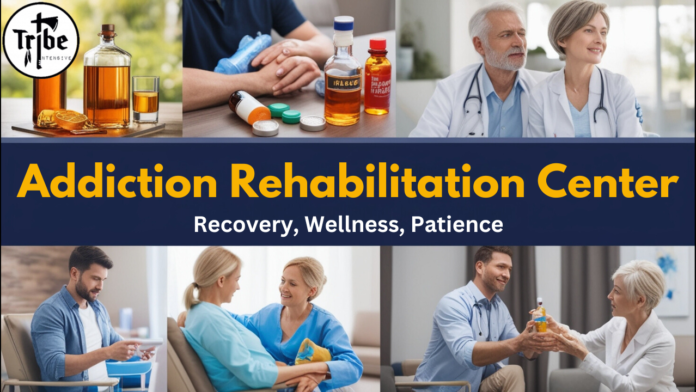Addiction is a complex and challenging situation that affects individuals, families, and communities. For those looking for a way to stunned substance dependency, addiction rehabilitation centers provide a organized and supportive environment designed to help personalities regain their lives. These facilities offer a mixture of medical care, therapy, and aftercare to address the complex nature of addiction.
What Are Addiction Rehabilitation Centers?
Addiction rehabilitation centers are facilities dedicated to treating substance abuse and addiction. These centers provide professional care, joining proof-based treatments with personalized programs to meet the unique needs of each patient.
Rehabilitation is not just about stopping substance use; it’s about learning to live a healthier, more satisfying life free from addiction.
Key Services Offered by Addiction Rehabilitation Centers
1. Medical Detoxification (Detox)
Detoxification is frequently the first step in addiction recovery. It involves adding harmful substances from the body in a safe and controlled method under medical supervision.
Benefits of Medical Detox:
- Ensures patient safety during withdrawal.
- Reduces the harshness of withdrawal symptoms.
- Prepares entities for the next stages of treatment.
2. Inpatient Rehabilitation Programs
Inpatient programs are engaging and involve living at the facility during treatment. They are ideal for individuals requiring a distraction-free environment to focus uniquely on recovery.
Core Features of Inpatient Programs:
- 24/7 medical and emotional support.
- Structured daily routines with therapy and activities.
- A community of associates working toward recovery.
3. Outpatient Rehabilitation Programs
Outpatient programs offer flexibility, allowing entities to attend therapy sessions while living at home. These programs are apposite for those with responsibilities like work, school, or family care.
Types of Outpatient Care:
- Partial hospitalization programs (PHPs).
- Intensive outpatient programs (IOPs).
- Individual and group therapy sessions.
Why Seek Help at Addiction Rehabilitation Centers?
Rehabilitation centers provide a safe, supportive, and stigma-free environment for recovery. They also address the basis sources of addiction, helping individuals build the skills needed for a maintainable, sober lifestyle.
Comprehensive Treatment Plans
Addiction rehabilitation centers approve a holistic approach, focusing on physical, mental, and emotional well-being. This multi-dimensional care rises the chances of long-term recovery.
Access to Professional Expertise
Centers service licensed therapists, medical professionals, and addiction specialists who guide individuals complete every stage of recovery.
Types of Therapy in Addiction Treatment
Effective addiction treatment goes past detoxification. It involves therapies that help individuals understand their behaviors and develop strategies for a substance-free life.
1. Cognitive Behavioral Therapy (CBT)
CBT helps entities identify and change negative understood patterns that add to addiction.
2. Group Therapy
Group sessions provide a platform to share experiences, receive support, and learn from others who have challenged similar challenges.
3. Family Counseling
Family therapy focuses on healing relationships stressed by addiction, raising a supportive home environment for recovery.
Long-Term Support and Aftercare
Recovery is a lifelong journey, and addiction rehabilitation centers stress the importance of aftercare. These programs provide sustained support as persons transition back into their daily lives.
Examples of Aftercare Services:
- Regular therapy sessions.
- Support groups like Alcoholics Anonymous (AA) or Narcotics Anonymous (NA).
- Improvement anticipation planning.
Choosing the Right Addiction Rehabilitation Center
Selecting the right facility can make a important difference in recovery outcomes. Here are some issues to consider:
1. Accreditation and Credentials
Ensure the center is qualified by reliable organizations and staffed with licensed professionals.
2. Treatment Philosophy
Some centers focus on 12-step programs, while others use alternative methods like holistic or faith-based care. Choose one that supports with your values and needs.
3. Location and Amenities
A facility’s environment can impact recovery. Some individuals desire peaceful, secluded locations, while others flourish in urban settings with more facilities.
Myths About Addiction Rehabilitation Centers
Despite their efficiency, numerous misunderstandings continue about rehabilitation centers. Let’s expose a few:
Myth 1: Rehab Is Only for Severe Cases
Fact: Rehabilitation can benefit anyone stressed with substance use, regardless of strictness.
Myth 2: Rehab Guarantees Immediate Recovery
Fact: Recovery is a process that requires time, effort, and assurance, even after completing a program.
Signs It’s Time to Seek Help
Identifying the need for professional help is the first step toward recovery. Here are some pointers that it may be time to consider an addiction rehabilitation center:
- Difficulty management daily responsibilities.
- Health problems produced by substance use.
- Anxious relationships with family or friends.
- Earlier unsuccessful attempts to quit.
The Road to Recovery
Addiction rehabilitation centers play a energetic role in helping individuals reconstruct their lives. They offer customized care, expert support, and the tools needed to overcome addiction. Whether you’re looking for help for yourself or a loved one, these centers provide a path toward hope, healing, and lasting temperance.





